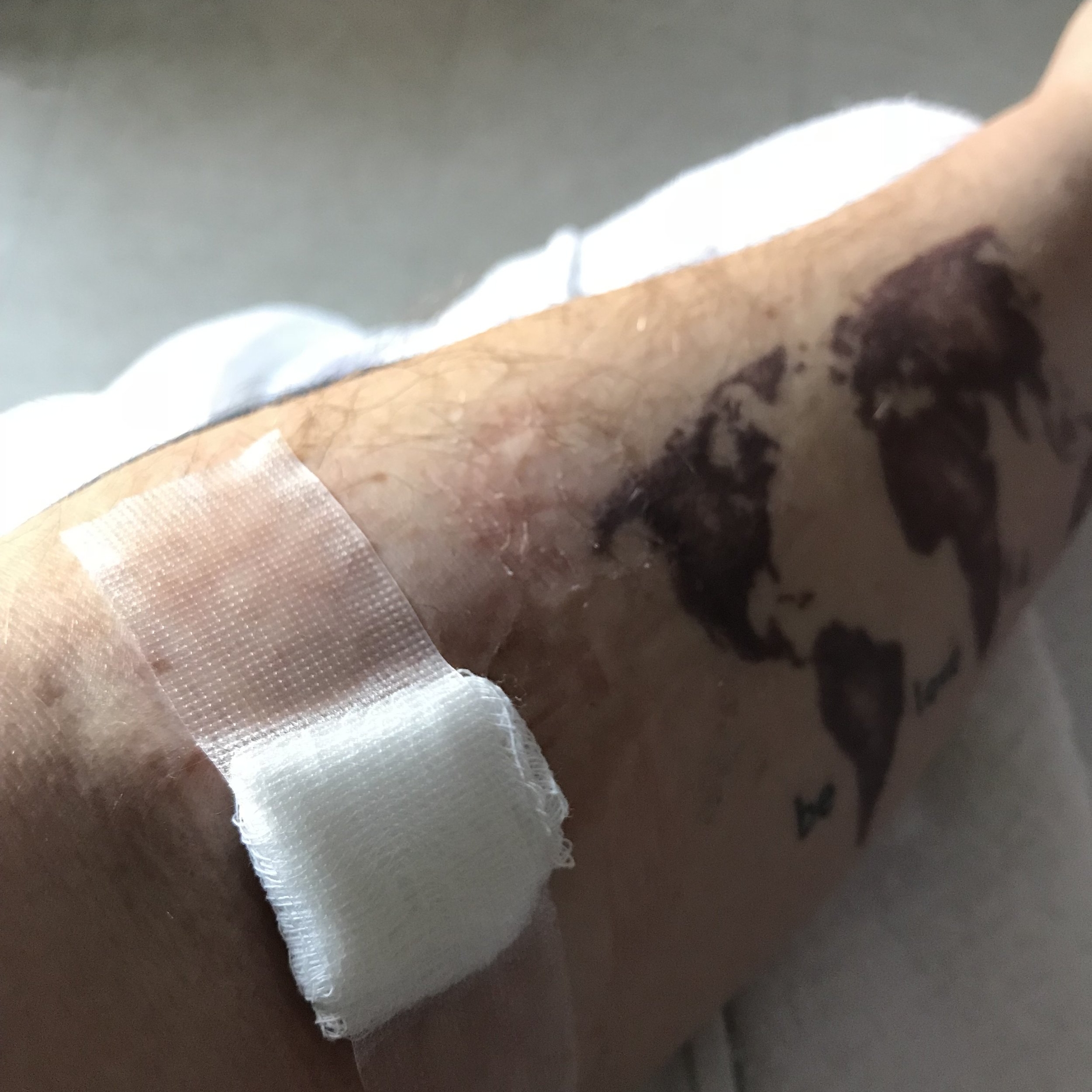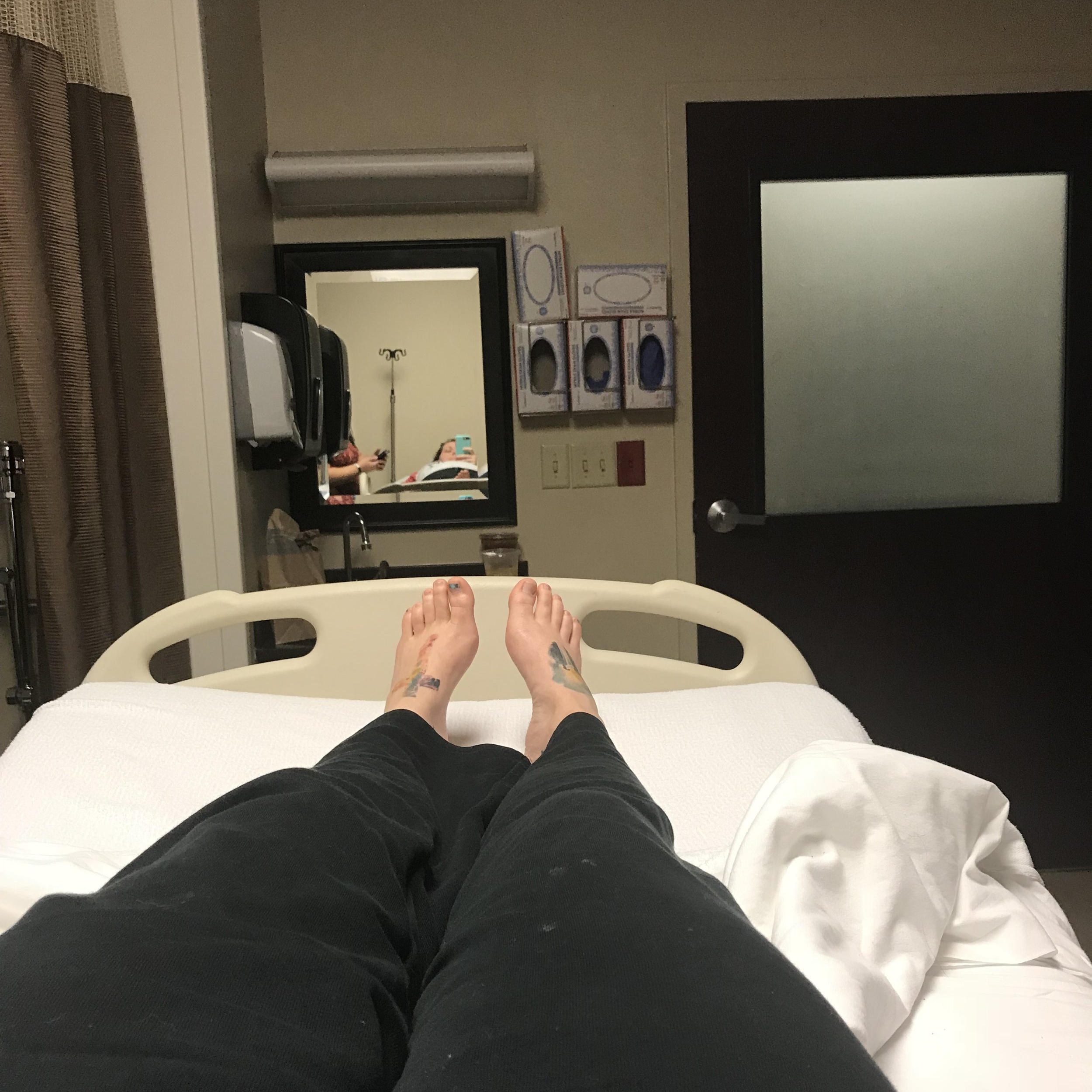I call myself a disabled woman, not a woman with disabilities. Here's why.
/Disabled.
It’s taken a long time for me to embrace that term. My knees were damaged in middle school, but I just called that bad knees. My back was first injured at age 23, too young for that sort of thing, but I just called that a fluke and had a corrective surgery. My health nosedived after my first child was born, but I first blamed it on suspected postpartum depression that I didn’t want to verify. Once I went to the doctor, I was diagnosed with a couple life-altering autoimmune disorders, but I planned to medicate and exercise them away.
But I wasn’t disabled
Another surgery, this time my wrist. More knee braces than any person should own. A knee surgery. A hardcore insistence that I was fine, just fine, as I told our adoption social worker and got my doctor to confirm. A falling apart emotionally after three months brought the one, two, three punch of my best friend’s suicide, our failed adoption of one of our children’s siblings, and the death of a dear friend's preschool son.
Through it all, I limped on my bad knees, gave myself shots or got IV infusions for my bad joints, took pills for my bad mental health, and sold a car and bought a new one as my bad hands couldn’t turn the key in the one I bought at 21.
I was comfortable calling all my parts bad, but I wasn’t disabled.
Meanwhile, I taught special ed for two years before and in the year of my first back surgery. I worked for Teach For America, re-writing their special educator training materials as my wrist recovered from surgery. I earned my MAEd in Special Education while being diagnosed with multiple disorders and starting IVs. At the same time, I launched an inclusive special needs ministry program at a large Baptist church in our area, speaking about the lessons learned at conferences around the country.
But I wasn’t disabled.
After the master’s and in the midst of ministry’s launch, we adopted a daughter with cerebral palsy who uses a wheelchair full-time. Our biological son had his first seizure and was diagnosed with epilepsy and then autism, ADHD, and anxiety. In between conferences in Philadelphia and Chicago, we adopted a sibling group of three, with the educational and emotional needs that come with older child adoption. One lives with HIV, and I added trainings in bloodborne pathogens, universal precautions, and stigma to my speaking topics.
But I was just fine. I was ready to call myself a special needs mom, but I wasn’t disabled.
I wrote as often as I could, seeming transparent about the topic at hand but hiding other areas of my life away. I went to therapy when I was so overwhelmed with life that the words didn’t come. I still clung to facts, reading all of the facts and style books and research.
As I did, truth seemed to shift in disconcerting ways. One truth I taught and wrote and lectured about was the importance of person-first language. I wrote essays about why labels limit us and modeled person-first language in my trainings. As I identified more with people with disabilities, I noticed they didn’t use that language. They self-identified as disabled people. I didn’t know what to do with that.
I do now. For starters, I am disabled. I wasn’t being honest with myself or anyone else when I tried to pretend I wasn’t. I use a cane most days. I use a wheelchair sometimes. I have a collection of tools I use to accommodate the limitations of my hands. I have physical disabilities.
I am a disabled woman. I’m also a white woman, a straight woman, a married woman, and a Christian woman. I wouldn’t call myself a person with whiteness, a person with heterosexualism, a person who is married, and a person who is a Christian. No, I’m comfortable with language that centers my race, sexuality, marital status, and faith, because each is considered part of my identity. So is being disabled. The only good reason I can see for not wanting to center my ability status is if being disabled is a bad thing. I bought into that, as you can see in my language throughout this article: bad knees, bad joints, bad mental health, and bad hands. I think that’s where person-first language started, with the idea that disability was negative. But that stigma, even when I accepted it, has never been right.
Some disabilities never fit well with identity-first language, though. My daughter wouldn’t ever be called cerebral palsied girl, and you usually only hear “a Downs kid” from someone who isn’t part of the Down syndrome community. No, it’s still a girl with cerebral palsy or a boy with Down syndrome. Likewise, I prefer to say I'm living with PTSD and would side-eye anyone who called me a PTSD person (though I'm fine with survivor). Meanwhile, when it comes to self-identification, it’s almost always autistic adults rather than adults with autism. Furthermore, language is important to the Deaf community in ways I can’t do justice here.
That said, some things haven’t changed. No one argues convincingly that the word retarded is ever okay anymore, even in the case of libtard or other variants. Neither is midget, even when Sho Baraka disappointingly drops it in a line in one of his songs. (I’m also not a fan of lame, spastic, moron, and other disability-associated words being used as negative slang, but I don’t usually make an issue of those in the way that my kids know I will if the r-word comes up.)
Confused yet? I know it’s all tricky. I didn’t write this as a list of what not to do but rather an essay about my own journey with both language and disability. Love trumps language, so don’t be scared away if you don’t know all the rules. Language evolves, as does our understanding of disability, so grace abounds. Want to know what words to use? Take a look at adults living with that particular disability. How do they identify themselves? That's a good indicator for how you should identify them as well. Beyond that, simply ask. Relationships are the context in which we use words anyway, right?
As a Christian, I consider my identity to be first and foremost in Christ. That doesn’t negate any other aspect of my earthly existence, though. I’m a disabled woman, and I’m finally okay saying that.






